人教版(2019)必修 第三册 unit 3 Diverse Cultures单元整体提升课件(共49张PPT)
文档属性
| 名称 | 人教版(2019)必修 第三册 unit 3 Diverse Cultures单元整体提升课件(共49张PPT) |
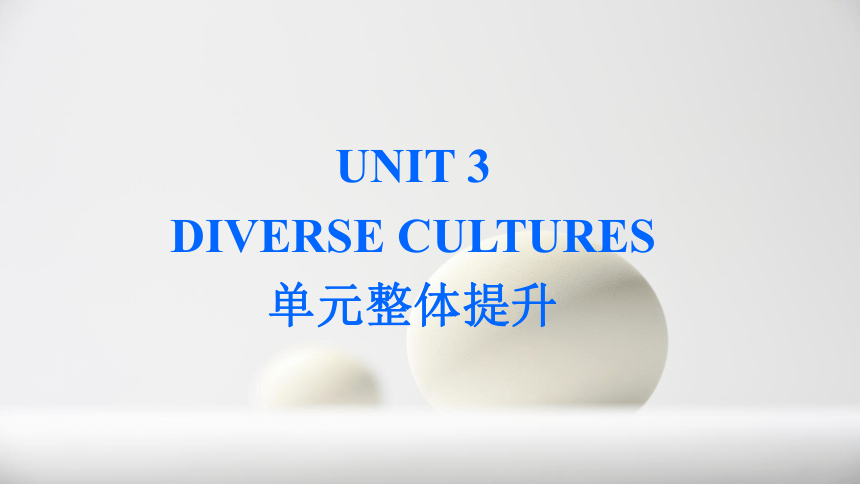
|
|
| 格式 | pptx | ||
| 文件大小 | 911.9KB | ||
| 资源类型 | 教案 | ||
| 版本资源 | 人教版(2019) | ||
| 科目 | 英语 | ||
| 更新时间 | 2023-07-22 10:48:42 | ||
图片预览

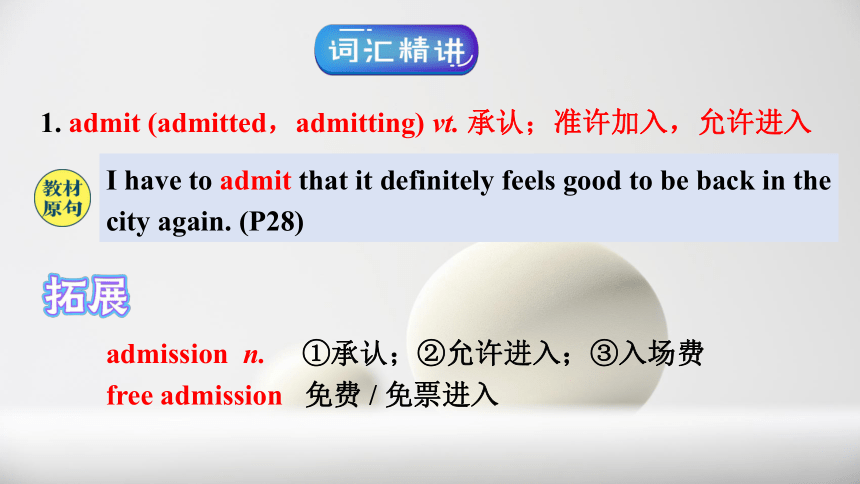
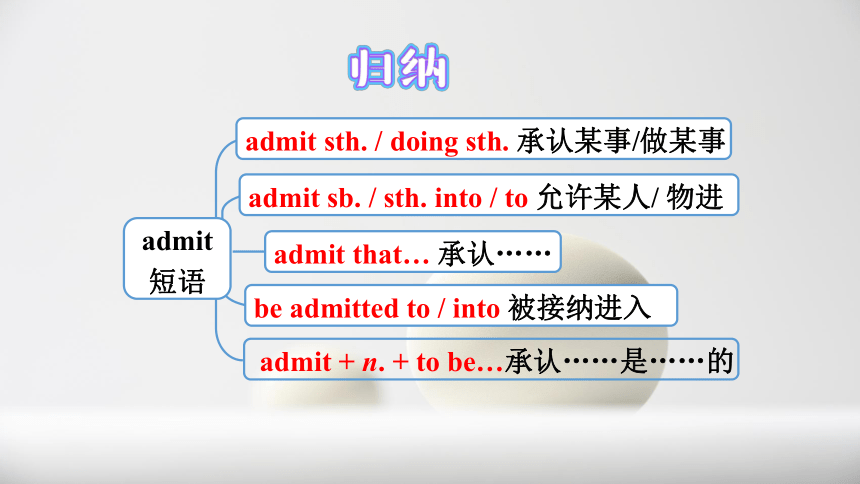
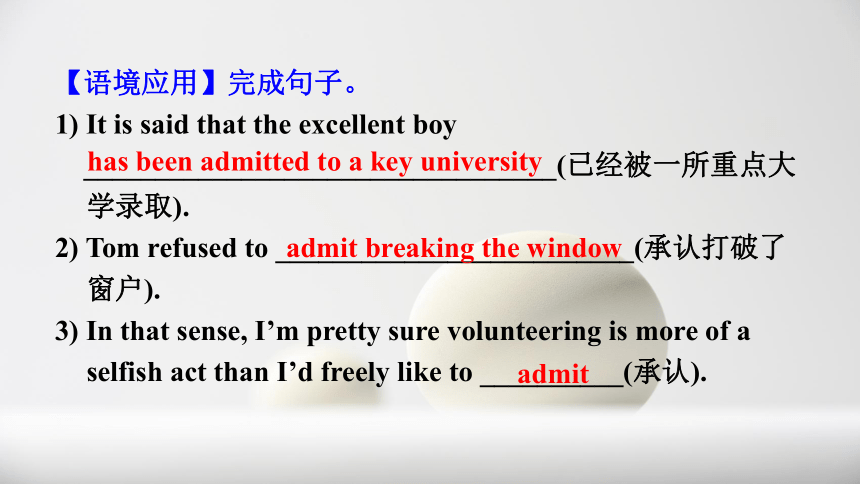
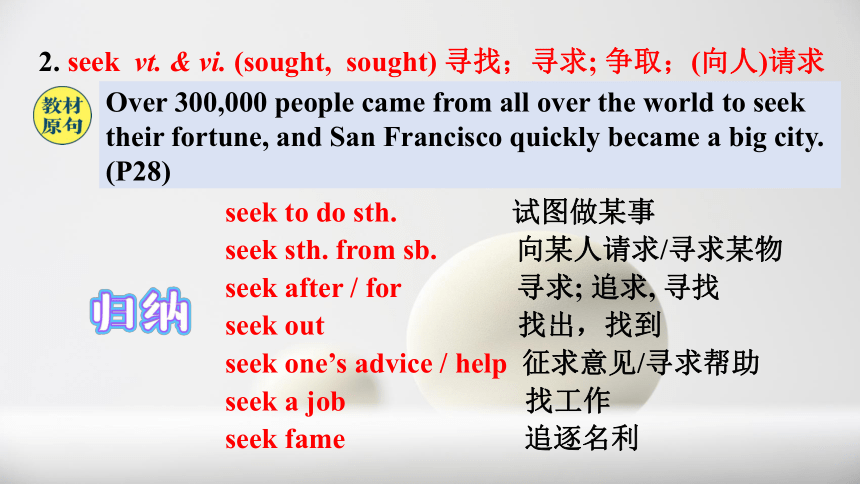
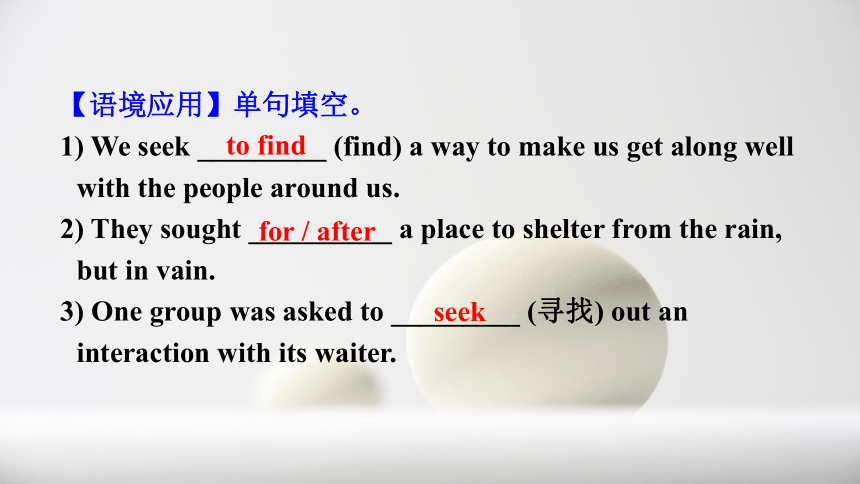
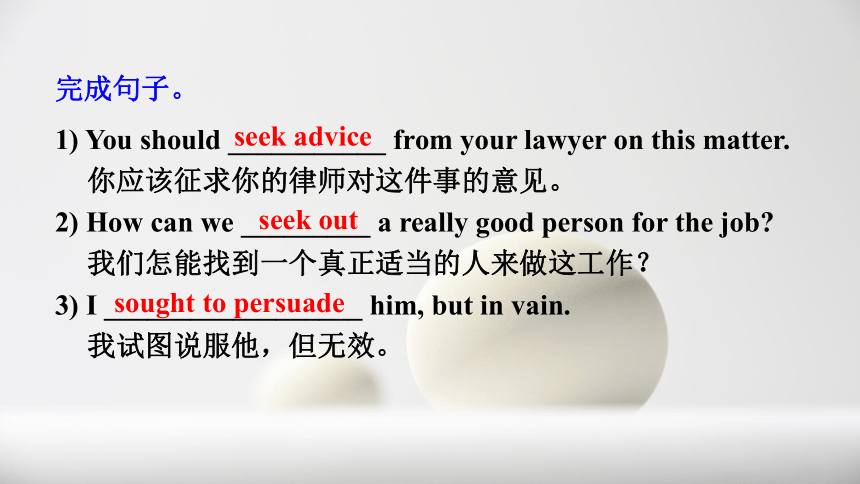
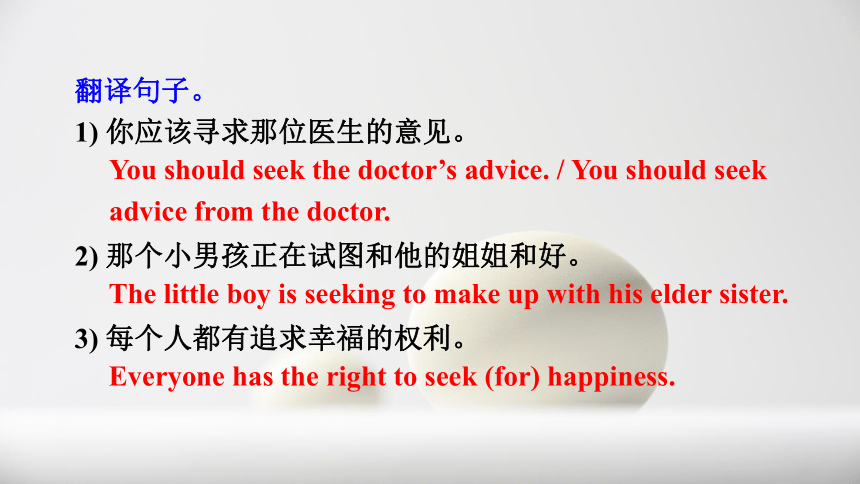

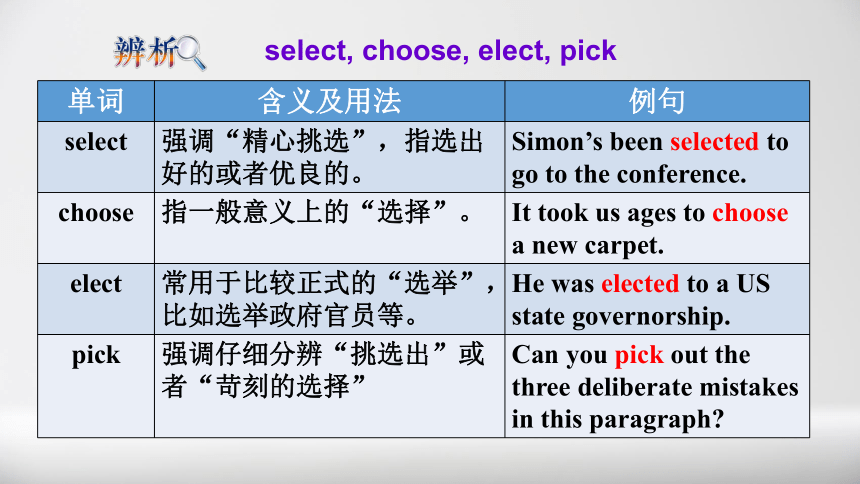

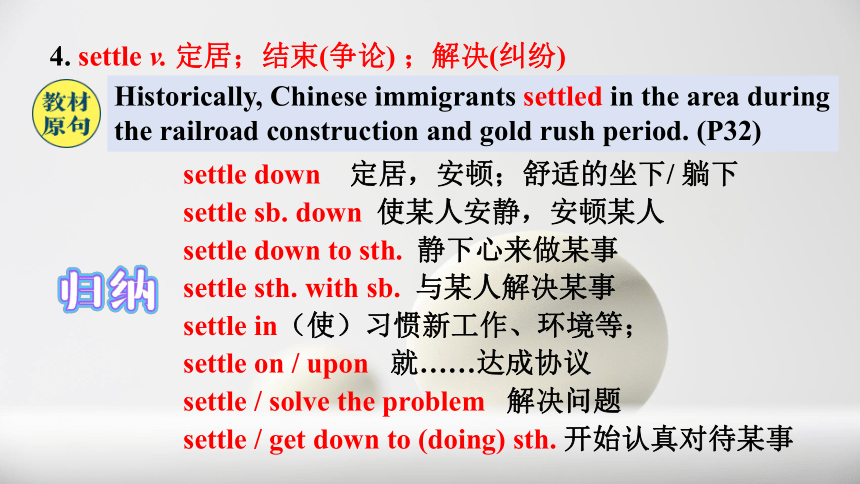
文档简介
(共49张PPT)
UNIT 3
DIVERSE CULTURES
单元整体提升
1. admit (admitted,admitting) vt. 承认;准许加入,允许进入
I have to admit that it definitely feels good to be back in the city again. (P28)
admission n. ①承认;②允许进入;③入场费
free admission 免费 / 免票进入
admit
短语
admit sth. / doing sth. 承认某事/做某事
admit + n. + to be…承认……是……的
admit that… 承认……
admit sb. / sth. into / to 允许某人/ 物进
be admitted to / into 被接纳进入
【语境应用】完成句子。
1) It is said that the excellent boy
_________________________________(已经被一所重点大学录取).
2) Tom refused to _________________________(承认打破了窗户).
3) In that sense, I’m pretty sure volunteering is more of a selfish act than I’d freely like to __________(承认).
has been admitted to a key university
admit breaking the window
admit
2. seek vt. & vi. (sought, sought) 寻找;寻求; 争取;(向人)请求
Over 300,000 people came from all over the world to seek their fortune, and San Francisco quickly became a big city. (P28)
seek to do sth. 试图做某事
seek sth. from sb. 向某人请求/寻求某物
seek after / for 寻求; 追求, 寻找
seek out 找出,找到
seek one’s advice / help 征求意见/寻求帮助
seek a job 找工作
seek fame 追逐名利
【语境应用】单句填空。
1) We seek _________ (find) a way to make us get along well with the people around us.
2) They sought __________ a place to shelter from the rain, but in vain.
3) One group was asked to _________ (寻找) out an interaction with its waiter.
to find
for / after
seek
1) You should ___________ from your lawyer on this matter.
你应该征求你的律师对这件事的意见。
2) How can we _________ a really good person for the job
我们怎能找到一个真正适当的人来做这工作?
3) I __________________ him, but in vain.
我试图说服他,但无效。
seek advice
seek out
sought to persuade
完成句子。
翻译句子。
1) 你应该寻求那位医生的意见。
2) 那个小男孩正在试图和他的姐姐和好。
3) 每个人都有追求幸福的权利。
You should seek the doctor’s advice. / You should seek advice from the doctor.
The little boy is seeking to make up with his elder sister.
Everyone has the right to seek (for) happiness.
3. select vt. 选择;挑选;选拔
I selected a Cantonese restaurant that served its food on beautiful china plates. (P29)
select ... as ... 挑选……作为……
select sb. to do ... 挑选某人做……
select ... from ... 从……中选出
select, choose, elect, pick
单词 含义及用法 例句
select 强调“精心挑选”,指选出好的或者优良的。 Simon’s been selected to go to the conference.
choose 指一般意义上的“选择”。 It took us ages to choose a new carpet.
elect 常用于比较正式的“选举”,比如选举政府官员等。 He was elected to a US state governorship.
pick 强调仔细分辨“挑选出”或者“苛刻的选择” Can you pick out the three deliberate mistakes in this paragraph
【语境应用】完成句子。
1) Six theatre companies ________________________________
(已被选定参加) this year’s festival.
2) York ________________________ (被选为新址) for the research centre.
3) I ___________________ (被选入) the school football team.
have been selected to take part in
was selected as the new site
was selected for
4. settle v. 定居;结束(争论) ;解决(纠纷)
Historically, Chinese immigrants settled in the area during the railroad construction and gold rush period. (P32)
settle down 定居,安顿;舒适的坐下/ 躺下
settle sb. down 使某人安静,安顿某人
settle down to sth. 静下心来做某事
settle sth. with sb. 与某人解决某事
settle in(使)习惯新工作、环境等;
settle on / upon 就……达成协议
settle / solve the problem 解决问题
settle / get down to (doing) sth. 开始认真对待某事
settler n. 移民,殖民者
settlement n. 解决,定居点
reach / arrive at a settlement 达成协议
e.g. His lawyers are understood to be negotiating a settlement.
据说他的律师正在谈一个协议。
They reached an out-of-court settlement.
他们达成了庭外和解。
【语境应用】完成句子。
People ______ (定居) in these places because they are easy to get to and naturally suited to communications and trade.
2) In recent years some Inuit people in Nunavut have reported increases in bear sightings around human __________ (settle).
3) After reaching a ___________ (settle) with the school, she soon _______ (settle) in her new school life.
settle
settlements
settlement
settled
1. head for / to 朝……前进; 将会碰到/遭到
In the afternoon I headed to a local museum that showed the historical changes in California. (P28)
【语境应用】翻译句子。
1. 如果你再那样处理问题,你就会遭到指责。
2. 直到昨天晚上七点我们才动身去伦敦。
If you go on dealing with problems like that, you are heading for blame.
We didn’t head for London until 7 o’clock last night.
2. seek one’s fortune 寻找致富之路;闯世界
Over 300,000 people came from all over the world to seek their fortune… (P28)
eg Young people go to big cities to seek their fortune.
年轻人去大城市寻求致富之路。
Coles came to the Yukon in the 1970s to seek his fortune.
Coles在 20 世纪 70 年代来到育空地区寻找致富之路。
3. apart from 除……之外
apart from
除了……以外(都)…… (相当于except/
except for)
除……之外(还)。表示包括,具有
besides, in addition to, as well as的含义。
【语境应用】翻译句子。
1) We had a pleasant time, apart from the weather.
______________________________________
2) Apart from reading, he also loves sports and music.
______________________________________
除了阅读之外,他还喜欢运动和音乐。
我们玩得很高兴,可就是天气不大好。
独立主格结构的语法特征是:它有自己的逻辑主语并且和句子的主语不一致;从语法功能上看,它可以充当时间状语、原因状语、条件状语、伴随状语等;
1. 独立主格结构
There are so many beautiful old buildings — many sitting on top of big hills, offering great views of the city, the ocean, and the Golden Gate Bridge. (P28)
独立主格结构的具体形式和用法如下:
(1) 名词(或代词)+ 非谓语动词 如:
1) Weather permitting, we’ll have an outing tomorrow.
(表示条件)
2) The boy turned to the man, his eyes opened wide.
(表示伴随情况)
3) The sports meeting to be held next week, we must get ready for it. (表示原因)
(2) 名词(或代词)+名词如:
He fought the wolf, a stick his only weapon. (表示方式)
(3)名词(或代词)+形容词如:
Dinner ready, the hostess asked her guests to be seated.
(表示时间)
(4) 名词(或代词)+副词如:
He put on his sweater, wrong side out. (表示伴随情况)
(5) 名词(或代词)+介词短语如:
In front of the house was a tall tree, its top well above the
tops of the other trees. (对前面名词进行解释)
(6) There being+名词(或代词)如:
There being no taxi, we had to walk home. (表示原因)
(7) It being+名词(或代词)如:
It being a holiday, all the shops were closed. (表示原因)
(8) with引导的独立主格结构如:
Don’t sleep with the window open. (表示伴随情况)
【语境应用】句型转换。
1) The party will be held in the garden, if weather permits.
→The party will be held in the garden, _________________.
weather permitting
2) Because much time is spent sitting at a desk, office workers are generally troubled by health problems.
→___________________ sitting at a desk, office workers are generally troubled by health problems.
Much time spent
2. 非限制性定语从句
The majority of residents in Chinatown are still ethnic Chinese, many of whom do not speak English fluently. (P32)
Traditionally, visitors enter Chinatown through the legendary Dragon Gate, which was built using materials donated from China. (P32)
… and there are Chinese tea stores, where visitors can taste and buy varieties of Chinese tea. (P32)
考点一:关系代词引导的非限制性定语从句
非限制性定语从句不能用that引导,先行词指物时可用which和whose引导,指人时可用who, whom, whose引导。另外,非限制性定语从句还可用as引导。
【注意】
1. which和as在非限制性定语从句中,可以指代主句或主句中的一部分,而在限制性定语从句中只可指代先行词。
2. as所引导的非限制性定语从句可以放在句首、句中或句末,而which所引导的非限制性定语从句只可以放在句末。
考点二:关系副词引导的非限制性定语从句
引导非限制性定语从句的关系副词有when, where, why等,在从句中分别作时间、地点、原因等状语。
考点三:“介词+关系代词”引导的非限制性定语从句
介词放在关系代词之前时,关系代词只能用which(指物)或whom(指人),介词的选择要视先行词、句意及与动词的搭配而定。
【语境应用】选择与改错。
1. Many lessons are now available online, from _____ students can choose for free.
A. whose B. which C. when D. whom
2. Thank you for your letter, what really made me happy.
3. Understanding her good intentions, I eat all the food what is provided by Mom with appreciation.
which
that
完成句子。
1. The 80,000 objects collected by Sir Hans Sloane, for example, formed the core collection of the British Museum _________ opened in 1759.
2. On the edge of the jacket, there is a piece of cloth __________ gives off light in the dark.
3. Now Irene Astbury works from 9 am to 5 pm daily at the pet shop in Macclesfield, _________ she opened with her late husband Les.
which/that
which
which/that
4. She and her family bicycle to work, _______ helps them keep fit.
5. My eldest son, _______ work takes him all over the world, is in New York at the moment.
6. In 1963 the UN set up the World Food Programme, one of _______ purposes is to relieve worldwide starvation.
whose
which
whose
7. Scientists have advanced many theories about why human beings cry tears, none of _________ has been proved.
8. Many young people, most of ________ were well-educated, headed for remote regions to chase their dreams.
which
whom
一、简单句中的省略
1. 省略主语、谓语或谓语的一部分、表语、宾语等。
(That / It) Sounds like a good idea.
(Does) Anybody want to go
— (Are you) Tired
— Yes, I am (tired).
Keep away (this bottle) from children.
2. 感叹句根据上下文省略。
How beautiful (it is)!
How (hard) they are working!
Ellipsis 省略
3. 名词所有格后的名词,如果表示住宅、店铺、教堂或上下文已经暗示或明确指出过的事物时,常省略。
At her mother’s (house) she passed many happy days.
4. 省略作宾语的动词不定式时,需保留to。
—Would you like to come to the party
—Yes, I’d like to (go to the party).
注意:如果动词不定式中含有be或have,省略时要保留be 或have。
—I didn’t tell him the news.
—Oh, you ought to have (told him the news).
二、并列句中的省略
在and, but等连接的并列句中,若后面的分句中存在与前面分句中相同的内容,这部分内容可以省略。
My room is on the fifth floor, and hers (is) on the eighth (floor).
She was poor but (she was) honest.
John was a lover of music then and he still is (a lover of music) now.
三、复合句中的省略
1. 主句中的省略。常见于句首或回答问题时。
— Why are you late
— (I’m late) Because my watch doesn’t work.
2. 从句中的省略。
宾语从句
1)主从句的谓语相同时,可以省略从句中的全部谓语甚至主语。
She didn’t attend the concert, and I wonder why (she didn’t attend the concert).
2) 在宾语从句中常省略连词that,但当及物动词之后跟两个或两个以上的宾语从句时,只有第一个that可省略。
She said (that) I should spend more time with children and that it was a must if I wanted to be a good parent.
【注意】有时可用so或not代替上文的内容。
e.g. Work hard. If not (If you don’t work hard), you will fail in the exam.
—Do you think Mr. Green will give us help
—I hope so. (I hope he will give us help.)
定语从句
1) 在限制性定语从句中,作宾语的关系代词that, which, whom, who等常可以省略。
Henry is the man (who / whom / that) you can depend on.
This is the little Italian restaurant (which / that) I mentioned in my letter.
2) 当先行词为表示方式的way时,引导定语从句的that或in which常可以省略。
The way (in which / that) Monica did things really impressed us.
状语从句
1) 当状语从句的主语与主句的主语一致,从句中的谓语动词 又包含be或主语是it,可把从句中的主语和be省略。
While (he was) doing homework, the boy listened to music.
When (they were) first introduced to the market, these products enjoyed great success.
2) 由than, as引导的比较状语从句中,相同部分可省略。
I love you better than he (loves you).
对话双方都知道的指代内容可以省略;
为了避免重复,下文会省略与上文一样的部分;
宾语从句中,主从句的谓语相同时,可以省略从句中的全部谓语甚至主语。但当及物动词之后跟两个或两个以上的宾语从句时,只有第一个that可省略。
状语从句中主语和主句主语一致,而且主语后是be动词,从句主语和be动词可以省略。
在限制性定语从句中,作宾语的关系代词that, which, whom, who等常可以省略。
简化下面句子或对话。
1. I sat near the window, and Mike sat near the door.
_____________________________________________
2. My father was a lover of sports and he still is a lover of sports now.
_____________________________________________
3. She said she’d call me but she hasn’t called me.
_____________________________________________
4. Have you heard this song
_____________________________________________
I sat near the window and Mike the door.
My father was a lover of sports and he still is now.
She said she’d call me but she hasn't.
Heard this song
5. —What you said hurt her deeply.
—I’m sorry. I didn’t mean to hurt her deeply.
_________________________________________
_________________________________________
6. —Who gave you that CD
—Dad gave it to me.
_________________________________________
_________________________________________
7. I lent it to someone but I can’t remember who I lent it to.
_________________________________________
—What you said hurt her deeply.
—I'm sorry. I didn’t mean to.
—Who gave you that CD
—Dad.
I lent it to someone but I can’t remember who.
8. —What is your favourite kind of music
—My favourite kind of music is jazz.
_________________________________________
_________________________________________
9. —Have you got many of his paintings
—I’ve got only two of his paintings.
_________________________________________
_________________________________________
10. He’ll come soon but I don’t know exactly when he’ll come.
_________________________________________
—What is your favourite kind of music
—Jazz.
—Have you got many of his paintings
—Only two.
He’ll come soon but I don’t know exactly when.
11. I’d certainly like to go back to Australia. I hope to go back to Australia next year.
___________________________________________________
12. The author whom you criticized in your review has written a letter in reply.
___________________________________________________
___________________________________________________
13. —How long have you been playing the guitar
—I’ve been playing for a long time, about ten years.
___________________________________________________
_________________________________________________
—How long have you been playing the guitar
—For a long time, about ten years.
The author you criticized in your review has written a letter in reply.
I’d certainly like to go back to Australia. I hope to next year.
【写作任务】
假定你校英文报的 MY HOMETOWN 栏目正面向全校学生征稿。请你根据以下提示,写一篇英语短文,介绍山西省会城市太原并投稿。
1. 位于汾河河畔,三面环山;
2. 古代军事重镇, 有2500多年的历史,文化底蕴深厚;
3. 重工业城市;
4. 有很多著名旅游景点,如晋祠(Jinci Temple中国现存最早的皇家园林)和天龙山石窟(Tianlong Mountain Caves其中的雕像可追溯到东魏);
5. 有很多面粉(flour)做的美食,尤以面条闻名。
如何介绍历史名城
注意:
1. 词数100左右;
2. 可以适当增加细节,以使行文连贯。 ______________________________________________________________________________________________________ ___________________________________________________ ___________________________________________________ ___________________________________________________
【写作指导】
一、审题定调
本篇习作要求介绍太原,属于说明文。短文内容应该包括对该城市的地理位置、(历史)地位、历史文化及主要景点等方面的介绍。在介绍一座城市时,应该突出该城市的特点,以吸引读者。
二、谋篇布局
根据写作要点提示,本写作可分为两部分:
第一部分:从地理位置及地位介绍太原的基本情况;
第二部分:从地理特征、历史文化、主要景点及美食等方 面详细介绍太原。
Taiyuan
Taiyuan, the capital of Shanxi Province, is one of China’s heavy industrial cities.
Situated on the Fen River and surrounded by mountains on its three sides, Taiyuan, once a place of military and cultural importance in ancient times, has a history of more than 2,500 years. That’s why Taiyuan is rich in tourist attractions and the most popular place is Jinci Temple, the earliest existing royal garden in China.
【参考范文】
Another landmark of Taiyuan is Tianlong Mountain Caves, where many vivid sculptures dating from the Eastern Wei Dynasty can be seen. In addition, Taiyuan is famous for food made of flour, among which noodles should be recommended first. They make the mouth of food-lovers water.
UNIT 3
DIVERSE CULTURES
单元整体提升
1. admit (admitted,admitting) vt. 承认;准许加入,允许进入
I have to admit that it definitely feels good to be back in the city again. (P28)
admission n. ①承认;②允许进入;③入场费
free admission 免费 / 免票进入
admit
短语
admit sth. / doing sth. 承认某事/做某事
admit + n. + to be…承认……是……的
admit that… 承认……
admit sb. / sth. into / to 允许某人/ 物进
be admitted to / into 被接纳进入
【语境应用】完成句子。
1) It is said that the excellent boy
_________________________________(已经被一所重点大学录取).
2) Tom refused to _________________________(承认打破了窗户).
3) In that sense, I’m pretty sure volunteering is more of a selfish act than I’d freely like to __________(承认).
has been admitted to a key university
admit breaking the window
admit
2. seek vt. & vi. (sought, sought) 寻找;寻求; 争取;(向人)请求
Over 300,000 people came from all over the world to seek their fortune, and San Francisco quickly became a big city. (P28)
seek to do sth. 试图做某事
seek sth. from sb. 向某人请求/寻求某物
seek after / for 寻求; 追求, 寻找
seek out 找出,找到
seek one’s advice / help 征求意见/寻求帮助
seek a job 找工作
seek fame 追逐名利
【语境应用】单句填空。
1) We seek _________ (find) a way to make us get along well with the people around us.
2) They sought __________ a place to shelter from the rain, but in vain.
3) One group was asked to _________ (寻找) out an interaction with its waiter.
to find
for / after
seek
1) You should ___________ from your lawyer on this matter.
你应该征求你的律师对这件事的意见。
2) How can we _________ a really good person for the job
我们怎能找到一个真正适当的人来做这工作?
3) I __________________ him, but in vain.
我试图说服他,但无效。
seek advice
seek out
sought to persuade
完成句子。
翻译句子。
1) 你应该寻求那位医生的意见。
2) 那个小男孩正在试图和他的姐姐和好。
3) 每个人都有追求幸福的权利。
You should seek the doctor’s advice. / You should seek advice from the doctor.
The little boy is seeking to make up with his elder sister.
Everyone has the right to seek (for) happiness.
3. select vt. 选择;挑选;选拔
I selected a Cantonese restaurant that served its food on beautiful china plates. (P29)
select ... as ... 挑选……作为……
select sb. to do ... 挑选某人做……
select ... from ... 从……中选出
select, choose, elect, pick
单词 含义及用法 例句
select 强调“精心挑选”,指选出好的或者优良的。 Simon’s been selected to go to the conference.
choose 指一般意义上的“选择”。 It took us ages to choose a new carpet.
elect 常用于比较正式的“选举”,比如选举政府官员等。 He was elected to a US state governorship.
pick 强调仔细分辨“挑选出”或者“苛刻的选择” Can you pick out the three deliberate mistakes in this paragraph
【语境应用】完成句子。
1) Six theatre companies ________________________________
(已被选定参加) this year’s festival.
2) York ________________________ (被选为新址) for the research centre.
3) I ___________________ (被选入) the school football team.
have been selected to take part in
was selected as the new site
was selected for
4. settle v. 定居;结束(争论) ;解决(纠纷)
Historically, Chinese immigrants settled in the area during the railroad construction and gold rush period. (P32)
settle down 定居,安顿;舒适的坐下/ 躺下
settle sb. down 使某人安静,安顿某人
settle down to sth. 静下心来做某事
settle sth. with sb. 与某人解决某事
settle in(使)习惯新工作、环境等;
settle on / upon 就……达成协议
settle / solve the problem 解决问题
settle / get down to (doing) sth. 开始认真对待某事
settler n. 移民,殖民者
settlement n. 解决,定居点
reach / arrive at a settlement 达成协议
e.g. His lawyers are understood to be negotiating a settlement.
据说他的律师正在谈一个协议。
They reached an out-of-court settlement.
他们达成了庭外和解。
【语境应用】完成句子。
People ______ (定居) in these places because they are easy to get to and naturally suited to communications and trade.
2) In recent years some Inuit people in Nunavut have reported increases in bear sightings around human __________ (settle).
3) After reaching a ___________ (settle) with the school, she soon _______ (settle) in her new school life.
settle
settlements
settlement
settled
1. head for / to 朝……前进; 将会碰到/遭到
In the afternoon I headed to a local museum that showed the historical changes in California. (P28)
【语境应用】翻译句子。
1. 如果你再那样处理问题,你就会遭到指责。
2. 直到昨天晚上七点我们才动身去伦敦。
If you go on dealing with problems like that, you are heading for blame.
We didn’t head for London until 7 o’clock last night.
2. seek one’s fortune 寻找致富之路;闯世界
Over 300,000 people came from all over the world to seek their fortune… (P28)
eg Young people go to big cities to seek their fortune.
年轻人去大城市寻求致富之路。
Coles came to the Yukon in the 1970s to seek his fortune.
Coles在 20 世纪 70 年代来到育空地区寻找致富之路。
3. apart from 除……之外
apart from
除了……以外(都)…… (相当于except/
except for)
除……之外(还)。表示包括,具有
besides, in addition to, as well as的含义。
【语境应用】翻译句子。
1) We had a pleasant time, apart from the weather.
______________________________________
2) Apart from reading, he also loves sports and music.
______________________________________
除了阅读之外,他还喜欢运动和音乐。
我们玩得很高兴,可就是天气不大好。
独立主格结构的语法特征是:它有自己的逻辑主语并且和句子的主语不一致;从语法功能上看,它可以充当时间状语、原因状语、条件状语、伴随状语等;
1. 独立主格结构
There are so many beautiful old buildings — many sitting on top of big hills, offering great views of the city, the ocean, and the Golden Gate Bridge. (P28)
独立主格结构的具体形式和用法如下:
(1) 名词(或代词)+ 非谓语动词 如:
1) Weather permitting, we’ll have an outing tomorrow.
(表示条件)
2) The boy turned to the man, his eyes opened wide.
(表示伴随情况)
3) The sports meeting to be held next week, we must get ready for it. (表示原因)
(2) 名词(或代词)+名词如:
He fought the wolf, a stick his only weapon. (表示方式)
(3)名词(或代词)+形容词如:
Dinner ready, the hostess asked her guests to be seated.
(表示时间)
(4) 名词(或代词)+副词如:
He put on his sweater, wrong side out. (表示伴随情况)
(5) 名词(或代词)+介词短语如:
In front of the house was a tall tree, its top well above the
tops of the other trees. (对前面名词进行解释)
(6) There being+名词(或代词)如:
There being no taxi, we had to walk home. (表示原因)
(7) It being+名词(或代词)如:
It being a holiday, all the shops were closed. (表示原因)
(8) with引导的独立主格结构如:
Don’t sleep with the window open. (表示伴随情况)
【语境应用】句型转换。
1) The party will be held in the garden, if weather permits.
→The party will be held in the garden, _________________.
weather permitting
2) Because much time is spent sitting at a desk, office workers are generally troubled by health problems.
→___________________ sitting at a desk, office workers are generally troubled by health problems.
Much time spent
2. 非限制性定语从句
The majority of residents in Chinatown are still ethnic Chinese, many of whom do not speak English fluently. (P32)
Traditionally, visitors enter Chinatown through the legendary Dragon Gate, which was built using materials donated from China. (P32)
… and there are Chinese tea stores, where visitors can taste and buy varieties of Chinese tea. (P32)
考点一:关系代词引导的非限制性定语从句
非限制性定语从句不能用that引导,先行词指物时可用which和whose引导,指人时可用who, whom, whose引导。另外,非限制性定语从句还可用as引导。
【注意】
1. which和as在非限制性定语从句中,可以指代主句或主句中的一部分,而在限制性定语从句中只可指代先行词。
2. as所引导的非限制性定语从句可以放在句首、句中或句末,而which所引导的非限制性定语从句只可以放在句末。
考点二:关系副词引导的非限制性定语从句
引导非限制性定语从句的关系副词有when, where, why等,在从句中分别作时间、地点、原因等状语。
考点三:“介词+关系代词”引导的非限制性定语从句
介词放在关系代词之前时,关系代词只能用which(指物)或whom(指人),介词的选择要视先行词、句意及与动词的搭配而定。
【语境应用】选择与改错。
1. Many lessons are now available online, from _____ students can choose for free.
A. whose B. which C. when D. whom
2. Thank you for your letter, what really made me happy.
3. Understanding her good intentions, I eat all the food what is provided by Mom with appreciation.
which
that
完成句子。
1. The 80,000 objects collected by Sir Hans Sloane, for example, formed the core collection of the British Museum _________ opened in 1759.
2. On the edge of the jacket, there is a piece of cloth __________ gives off light in the dark.
3. Now Irene Astbury works from 9 am to 5 pm daily at the pet shop in Macclesfield, _________ she opened with her late husband Les.
which/that
which
which/that
4. She and her family bicycle to work, _______ helps them keep fit.
5. My eldest son, _______ work takes him all over the world, is in New York at the moment.
6. In 1963 the UN set up the World Food Programme, one of _______ purposes is to relieve worldwide starvation.
whose
which
whose
7. Scientists have advanced many theories about why human beings cry tears, none of _________ has been proved.
8. Many young people, most of ________ were well-educated, headed for remote regions to chase their dreams.
which
whom
一、简单句中的省略
1. 省略主语、谓语或谓语的一部分、表语、宾语等。
(That / It) Sounds like a good idea.
(Does) Anybody want to go
— (Are you) Tired
— Yes, I am (tired).
Keep away (this bottle) from children.
2. 感叹句根据上下文省略。
How beautiful (it is)!
How (hard) they are working!
Ellipsis 省略
3. 名词所有格后的名词,如果表示住宅、店铺、教堂或上下文已经暗示或明确指出过的事物时,常省略。
At her mother’s (house) she passed many happy days.
4. 省略作宾语的动词不定式时,需保留to。
—Would you like to come to the party
—Yes, I’d like to (go to the party).
注意:如果动词不定式中含有be或have,省略时要保留be 或have。
—I didn’t tell him the news.
—Oh, you ought to have (told him the news).
二、并列句中的省略
在and, but等连接的并列句中,若后面的分句中存在与前面分句中相同的内容,这部分内容可以省略。
My room is on the fifth floor, and hers (is) on the eighth (floor).
She was poor but (she was) honest.
John was a lover of music then and he still is (a lover of music) now.
三、复合句中的省略
1. 主句中的省略。常见于句首或回答问题时。
— Why are you late
— (I’m late) Because my watch doesn’t work.
2. 从句中的省略。
宾语从句
1)主从句的谓语相同时,可以省略从句中的全部谓语甚至主语。
She didn’t attend the concert, and I wonder why (she didn’t attend the concert).
2) 在宾语从句中常省略连词that,但当及物动词之后跟两个或两个以上的宾语从句时,只有第一个that可省略。
She said (that) I should spend more time with children and that it was a must if I wanted to be a good parent.
【注意】有时可用so或not代替上文的内容。
e.g. Work hard. If not (If you don’t work hard), you will fail in the exam.
—Do you think Mr. Green will give us help
—I hope so. (I hope he will give us help.)
定语从句
1) 在限制性定语从句中,作宾语的关系代词that, which, whom, who等常可以省略。
Henry is the man (who / whom / that) you can depend on.
This is the little Italian restaurant (which / that) I mentioned in my letter.
2) 当先行词为表示方式的way时,引导定语从句的that或in which常可以省略。
The way (in which / that) Monica did things really impressed us.
状语从句
1) 当状语从句的主语与主句的主语一致,从句中的谓语动词 又包含be或主语是it,可把从句中的主语和be省略。
While (he was) doing homework, the boy listened to music.
When (they were) first introduced to the market, these products enjoyed great success.
2) 由than, as引导的比较状语从句中,相同部分可省略。
I love you better than he (loves you).
对话双方都知道的指代内容可以省略;
为了避免重复,下文会省略与上文一样的部分;
宾语从句中,主从句的谓语相同时,可以省略从句中的全部谓语甚至主语。但当及物动词之后跟两个或两个以上的宾语从句时,只有第一个that可省略。
状语从句中主语和主句主语一致,而且主语后是be动词,从句主语和be动词可以省略。
在限制性定语从句中,作宾语的关系代词that, which, whom, who等常可以省略。
简化下面句子或对话。
1. I sat near the window, and Mike sat near the door.
_____________________________________________
2. My father was a lover of sports and he still is a lover of sports now.
_____________________________________________
3. She said she’d call me but she hasn’t called me.
_____________________________________________
4. Have you heard this song
_____________________________________________
I sat near the window and Mike the door.
My father was a lover of sports and he still is now.
She said she’d call me but she hasn't.
Heard this song
5. —What you said hurt her deeply.
—I’m sorry. I didn’t mean to hurt her deeply.
_________________________________________
_________________________________________
6. —Who gave you that CD
—Dad gave it to me.
_________________________________________
_________________________________________
7. I lent it to someone but I can’t remember who I lent it to.
_________________________________________
—What you said hurt her deeply.
—I'm sorry. I didn’t mean to.
—Who gave you that CD
—Dad.
I lent it to someone but I can’t remember who.
8. —What is your favourite kind of music
—My favourite kind of music is jazz.
_________________________________________
_________________________________________
9. —Have you got many of his paintings
—I’ve got only two of his paintings.
_________________________________________
_________________________________________
10. He’ll come soon but I don’t know exactly when he’ll come.
_________________________________________
—What is your favourite kind of music
—Jazz.
—Have you got many of his paintings
—Only two.
He’ll come soon but I don’t know exactly when.
11. I’d certainly like to go back to Australia. I hope to go back to Australia next year.
___________________________________________________
12. The author whom you criticized in your review has written a letter in reply.
___________________________________________________
___________________________________________________
13. —How long have you been playing the guitar
—I’ve been playing for a long time, about ten years.
___________________________________________________
_________________________________________________
—How long have you been playing the guitar
—For a long time, about ten years.
The author you criticized in your review has written a letter in reply.
I’d certainly like to go back to Australia. I hope to next year.
【写作任务】
假定你校英文报的 MY HOMETOWN 栏目正面向全校学生征稿。请你根据以下提示,写一篇英语短文,介绍山西省会城市太原并投稿。
1. 位于汾河河畔,三面环山;
2. 古代军事重镇, 有2500多年的历史,文化底蕴深厚;
3. 重工业城市;
4. 有很多著名旅游景点,如晋祠(Jinci Temple中国现存最早的皇家园林)和天龙山石窟(Tianlong Mountain Caves其中的雕像可追溯到东魏);
5. 有很多面粉(flour)做的美食,尤以面条闻名。
如何介绍历史名城
注意:
1. 词数100左右;
2. 可以适当增加细节,以使行文连贯。 ______________________________________________________________________________________________________ ___________________________________________________ ___________________________________________________ ___________________________________________________
【写作指导】
一、审题定调
本篇习作要求介绍太原,属于说明文。短文内容应该包括对该城市的地理位置、(历史)地位、历史文化及主要景点等方面的介绍。在介绍一座城市时,应该突出该城市的特点,以吸引读者。
二、谋篇布局
根据写作要点提示,本写作可分为两部分:
第一部分:从地理位置及地位介绍太原的基本情况;
第二部分:从地理特征、历史文化、主要景点及美食等方 面详细介绍太原。
Taiyuan
Taiyuan, the capital of Shanxi Province, is one of China’s heavy industrial cities.
Situated on the Fen River and surrounded by mountains on its three sides, Taiyuan, once a place of military and cultural importance in ancient times, has a history of more than 2,500 years. That’s why Taiyuan is rich in tourist attractions and the most popular place is Jinci Temple, the earliest existing royal garden in China.
【参考范文】
Another landmark of Taiyuan is Tianlong Mountain Caves, where many vivid sculptures dating from the Eastern Wei Dynasty can be seen. In addition, Taiyuan is famous for food made of flour, among which noodles should be recommended first. They make the mouth of food-lovers water.
